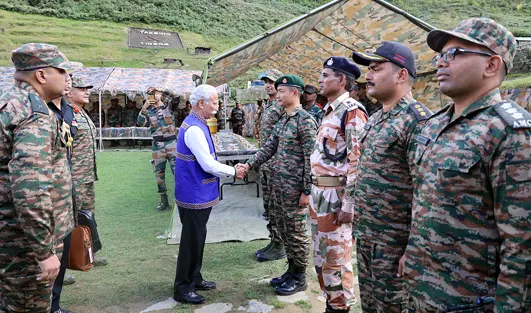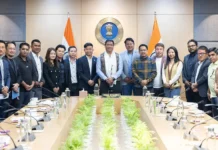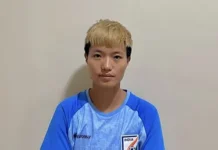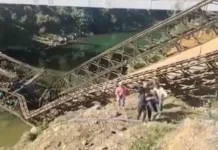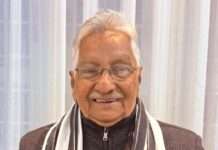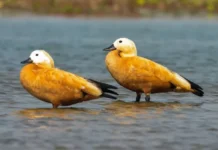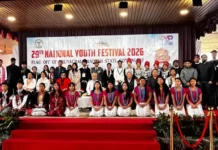ITANAGAR, 29 Sep: Governor KT Parnaik exhorted the armed forces personnel deployed at the Sino-India border to “remain alert all the time and uphold the gallant traditions of the Indian armed forces in guarding the sensitive borders.”
The governor, who visited border village Taksing in Upper Subansiri district on Friday, interacted with the armed forces personnel, and said that “the international border of Arunachal Pradesh in Taksing sector is sensitive and strategically important for the security of the nation.”
Parnaik had earlier visited Taksing as the general officer commanding of the 4 Corps in 2008.
He encouraged the personnel to maintain physical fitness and sound mental alertness, and shared modern-day security designs and steps with the personnel to keep the border safe and secure.
The governor advised the officers and the personnel to maintain cordial relations with the villagers and assist them in times of need.
The officers and personnel of the Rajputana Rifles, the Garhwal Rifles, the Arunachal Scouts, the 340 field regiment, and the Indo-Tibetan Border Police were present during the interaction.
Guv advocates collaborative effort to develop villages
Governor KT Parnaik said that “collaborative effort must be adopted, involving the state administration, the armed forces and villagers, to make villages vibrant.”
The governor said this during his visit to Taksing, one of the ‘vibrant border villages’ selected under the vibrant village pilot programme in the state.
Addressing a public meeting, the governor said that the Vibrant Villages Programme (VVP) aims to provide all basic facilities to the “first village near the border,” and added that “facilities must be shared among the stakeholders.”
Parnaik assured the villagers that “top priority will be accorded to road connectivity,” and exhorted them to “plan and build up for future by developing infrastructure, tourist attractions, community halls, and become self-reliant.”
The governor informed that several programmes and schemes are in the pipeline, “but to make them successful, it will require contribution and involvement of the people,” and urged the villagers to assist the government officials involved in the VVP.
Parnaik appealed to the GBs, panchayat members and government officials to “assist in eradication of tuberculosis, cancer, and drug addiction.”
He also recommended “setting up village volunteers, particularly womenfolk, who can be trained in healthcare, hygiene and sanitation,” and informed that the volunteers would be rewarded with incentives by the state government.
The governor advised the villagers to harness the area’s horticultural and agricultural potential, and said that “surplus produce can be sold to armed forces posted in the border areas, as this will ensure fresh vegetables for the armed forces personnel and economic empowerment of the villages in the border areas.”
Stressing on the importance of education and sports activities, the governor advised the villagers to send their wards to schools, and to “give the children wholesome upbringing at home, so that they imbibe the teaching at school.”
ADC Takar Rava and Nah Welfare Society president Keru Chader also spoke.
The governor interacted with the HoDs and advised them to “sincerely ensure that benefits reach the last person in the queue.”
Earlier, he interacted with members of SHGs, and visited an exhibition of fresh fruits, vegetables and prepared food products. As a gesture of goodwill, he presented financial assistance to the SHGs.
Parnaik also visited the government upper primary school and interacted with the students and teachers. He expressed hope that the educational infrastructure would improve under the VVP “very soon.” (Raj Bhavan)

